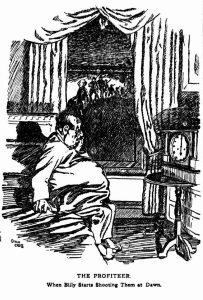[Editor: This illustration was published in Smith’s Weekly (Sydney, NSW), 30 August 1919.]
The profiteer.
When Billy starts shooting them at dawn.

Source:
Smith’s Weekly (Sydney, NSW), 30 August 1919, p. 1
Editor’s notes:
In this illustration a profiteer, looking through his window, can see Prime Minister Billy Hughes marching with a column of Australian soldiers behind him.
Billy = William Morris (Billy) Hughes (1862-1952), one of Australia’s longest-serving federal parliamentarians (1901-1952); he was Prime Minister of Australia 1915-1923, which included the First World War (1914-1918); he was born in 1862 in Pimlico (London, England), migrated to Australia in 1884, and died in Lindfield (Sydney, NSW) in 1952
See: 1) L. F. Fitzhardinge, “Hughes, William Morris (Billy) (1862–1952)”, Australian Dictionary of Biography
2) “Billy Hughes”, Wikipedia
profiteer = (in the context or wartime) a war profiteer, someone who makes excessive, unfair, or unreasonable profits at the expense of the community or the nation, by taking advantage of a wartime situation (especially when certain goods are in short supply); often referring to 1) someone who increases prices due to the wartime scarcity of goods, such as when the seller has a monopoly or is a rare, limited, or essential supplier, 2) a seller of armaments and/or equipment for military purposes, who makes high profits, and 3) someone who makes high profits by selling goods on the black market (such as during a time of government-enforced rationing, when the amount of certain goods people can buy is limited by official decree)
Leave a Reply